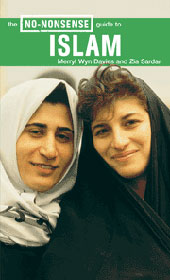"Al-Qaida does not speak for Islam or for the vast majority of Muslims worldwide who want to live in peace with their neighbors, practice their faith in freedom and raise their children in societies based on justice and mutual respect."
 The No-Nonsense Guide to Islam by Merryl Wyn Davies and Zia Sardar aims to make the same point by dispelling some of the conventional ignorance about Islam so commonplace in Europe and the United States.
The No-Nonsense Guide to Islam by Merryl Wyn Davies and Zia Sardar aims to make the same point by dispelling some of the conventional ignorance about Islam so commonplace in Europe and the United States. The authors are British Muslims. Davies is a writer and anthropologist and a former producer of religious programs for the BBC. Sardar is a writer, broadcaster, and cultural critic. They are co-authors of the British best seller, Why Do People Hate America?
Davies and Sardar do a good job of communicating the elementary basics of Islam as a belief system and offer a solid once-over-lightly of its history and culture. In a language familiar to Christians, they seem to be calling for a kind of "reformation" within Islam, both through going back to the roots and by adapting to the times. If there is one thing that no outsider should attempt to comment on, it is whether such a reformation is called for or possible. That's Muslims' business.
But Davies and Sardar set themselves another difficult task: they want to fill the gulf of incomprehension that opens up when people from historically Christian-dominant societies, ask:
Now this problem is, or should be, a familiar disjunction between the religious ideals and lived reality.What is the "real Islam"?
When confronted with the reality of terrorist attacks or the authoritarianism so evident in Muslim states such as Saudi Arabia or the Sudan, or the oppression of women in places like Afghanistan and Pakistan, Muslims have tended, conventionally, to point towards history. "Just look at our glorious history to see what real Islam is all about," they say....
The trouble is that all this is history. It is far temporally and in temperament from contemporary Islam.
It reminds me of the enormous gulf between the early, precarious Jesus community, described in the Gospels and the Book of Acts, and the Christian church since it became the imperial religion under the late Roman Empire. From the latter came everything from Crusades, to witch burnings, to modern day murders of abortion doctors.
It reminds me that today a state which insists on its Jewish character "defends" Jews by firing one million cluster bombs into populated areas of Lebanon.
Faiths that exercise temporal power seem to risk becoming morally and intellectually ossified. Islam is not alone in this. Its embattled defenders in Western lands have a lot in common with believers of other stripes. If only we could all recall that whatever we call our Ultimate Concern, that concern is greater than guns or governments....
1 comment:
Sorry for the glibness but I've decided that monotheism is a very bad idea and that all revealed wisdom from the Sinai desert needs to go back into whatever Pandora Box from which it sprang.
The Jewish, Christian and Muslim faiths are offshoots of each other and all of their histories tend to be grotesquely war-driven.
So I've decided not to even remotely trust any religion without at least four deities attached to them. This, by the way, includes the more florid Catholics who sneak under the radar gun of my particular prejudice with their worship of all those fabulous saints who channel one's energy towards the godhead.
Post a Comment